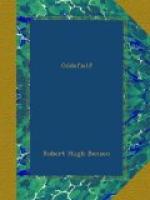Then, all of a sudden I saw his meaning; and my heart stood still; for not only did his words reveal him to me, but myself also; and I understood why he had questioned me so closely in town, as to my fortune. I cannot say at this time that I loved my Cousin Dolly—for I had not known that I loved her—but his words were very effective. Indeed I had not thought to marry, though I was free to do so; for a novice does not quickly shake off his monkishness. I had thought far more of the mission I was come to England upon, and what I could accomplish, with God’s blessing, for Christ and His Church. But, as I say, my heart stood still when my cousin said that to me; for, as in a vision, I saw myself here as her husband, and her as my wife, in this house among its gardens. Here we might live a life which even the angels might envy—harmless, innocent, separate from sinners, as the Apostle says—not accomplishing, maybe, any great things, but at least refraining from the hindering of God’s Kingdom. The summers would come and go, and we still be here, with our children growing about us, to inherit the place and the name, such as it was. And no harm done, no vows broken, no offence to any. Such thoughts as these did not as yet shew any very great ardour of love in me; and indeed I had not got this yet; but she was the first maid I had ever had any acquaintance with, at least for some while; and this no doubt, had its effect upon me. All this came upon me of a sudden; and as I lifted my eyes I saw my Cousin Dolly’s sunbonnet going among the herbs of the garden; and saw her in my mind’s eye too as I had seen her just now, cool and innocent and good, with that touch of hidden fire in her eyes that draws a man’s heart. Neither had she looked unkindly on me: our intimacy had made wonderful progress, though I had known her scarcely more than a week: she had spoken to me of her father, too, as one would speak only to a friend. Yet I could not say one word of this to him; for he had not said anything explicit to me: and I knew, too, that I must give myself time; for a man does not, if he is wise, change the course of his life on an instant’s thought. Yet I must not say No outright, and thereby, maybe, bang the door on my new hopes.
“I could not advise you at present,” I said. “I do not know my cousin well enough to advise anything. I am one with you so far as concerns the Court: I cannot think that any Catholic father should send his daughter into such a den of lions—and worse. And I am one with you as concerns marrying her to a Protestant. Yet I can say no more at present.”
And at that my Cousin Tom looked at me in such a manner as near to ruin his own scheme; for his eyes said, if his mouth did not, that now we understood one another; and were upon the same side, or at least not opposed; and to think that I was leagued with him against her made my heart hot with anger.
“Very well,” he said; “we will say no more at present.” And he bade me observe an old ram that was regarding us, with a face not unlike Cousin Tom’s own: but I suppose that he did not know this.




